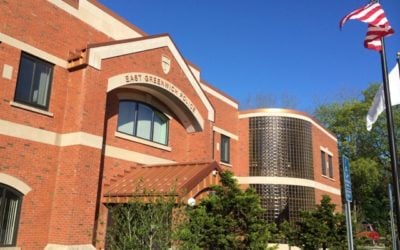East Greenwich resident and Providence School Supt. Susan Lusi made headlines last week when she called the NECAP graduation requirement “unfair.” Gov. Chafee said Lusi was wrong during a visit to EG Friday.
On Sunday, Lusi explained why she was only now coming out against the policy – put in place in 2011 – which requires that high school seniors in 2014 score “partially proficient” on the math and English portions of the NECAP standardized tests in order to receive a diploma.
In Providence, 605 seniors have yet to score high enough on the NECAP to graduate. By contrast, according to EG Supt. Victor Mercurio, there are fewer than 5 EG seniors at risk of not graduating because of the NECAP.
Lusi said she’d had research done this past year looking into the differences between the NECAP test and the test used by Massachusetts as its graduation requirement, the MCAS (Massachusetts Comprehensive Assessment System), and the results prompted her to speak out.
“I do very fundamentally believe in high standards for all students … and diplomas have to mean something,” she said. In light of Massachusetts’ top national academic ranking two decades after it passed legislation implementing a high-stakes test, it’s understandable, Lusi said, that Rhode Island would be interested in pursuing a similar strategy.
“It was initially appealing to look at Massachusetts – they have a test, maybe this is the right way to go,” she said. “At a very superficial level we in our state said, ‘Let’s do what they did.’ Except that we didn’t do that. I understand that that much better now.”
Lusi said she has three problems with Rhode Island’s graduation test requirement: the way the test is constructed, the way it’s administered and the effects the policy is having on the educational system as a whole.
“The MCAS was designed from the outset to be an exam with stakes for kids. They said, today’s first graders, when they’re in high school, will have to pass the test,” she said of the Massachusetts Dept. of Elementary and Secondary Education. “The NECAP was designed to give the state, districts and schools information about school performance as opposed to individual performance.”
The NECAP also does not give as much support to English language learners, especially Spanish-speaking English language learners, as the MCAS does, Lusi said. That’s particularly difficult for districts like Providence, where over 80 percent of the ELL students are Spanish speakers. Right now, 19 percent of Providence students are in an ELL program, but the number affected is closer to 25 percent when you factor in ELL students whose parents waive them out of the program and those who’ve recently “graduated” the program, she said.
The second issue with the Rhode Island policy is the timing of the test, she said. The NECAP is taken in the fall; the MCAS is taken in the spring. “Summer learning loss is enormously detrimental to poor kids, special education kids and ELL students,” she said.
Lusi’s third issue with the NECAP graduation requirement is the toll it’s taking on the education system as a whole. “It is tying itself up into knots to get kids through the waiver process,” she said. Students unable to score partially proficient or show enough improvement on the test can apply for a waiver, but the rules are complex.
“We of all systems need to be very focused aligning to the Common Core,” Lusi said, referring to the new set of national academic standards being put in place. “I’ve seen what this is doing to our system and how it’s preventing us from preparing for the shift to the Common Core.”
Of Providence’s 605 students at risk of not graduating, 515 students have done everything else needed to earn a diploma, i.e., passed the requisite number of courses.
Gov. Chafee on Friday said the number of students who won’t be able to graduate will be kept to a “very very bare minimum.”
“I don’t know if that’s going to happen,” responded Lusi. Providence took the waiver procedure seriously, she said. If waivers are just granted, “then why are we engaged in this process? With all due respect to the governor, I just don’t think that’s true.”
Lusi said she hopes the Rhode Island Dept. of Education will eliminate the testing requirement for graduation, citing a number of bills before the General Assembly that would prevent the requirement. She said she has the support of the Providence School Committee, which sent a letter to RIDE a year ago opposing the testing requirement.
“I have not said I would never, ever support a testing requirement for kids. That said, my issue here is with the way the test is constructed, the timing of the test, and the system effects,” she said. “We should not be holding individual kids accountable for very dramatic system failures.”





 Subscribe
Subscribe